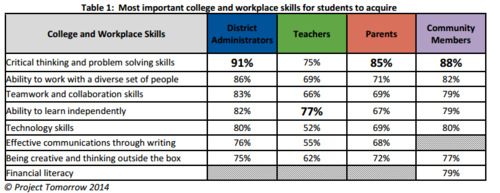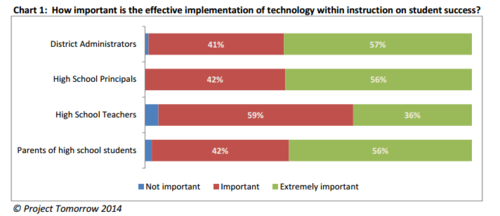School Leaders See Potential for Mobile Devices to Help College, Career Preparation, Survey Finds
By guest blogger Danielle Wilson
School leaders, teachers, and parents agree that personal mobile devices are helping students prepare for college and careers, despite implementation challenges that include inadequate connectivity, a need for better professional development, and tight budgets.
This is according to findings from the 2013 Speak Up National Research Project, a nationwide survey. The results, released in a report titled The New Digital Learning Playbook: Advancing College- and Career-Ready Skill Development in K-12 Schools, is the analysis taken from surveys conducted in 2013 by the education nonprofit Project Tomorrow. The new report examines how technology is being used in classrooms in the United States to support college and career preparation.
Forty-six percent of district administrators identified the implementation of online learning, digital content, and mobile devices as a major factor in student college- and career-readiness. They identified tablets, one-to-one programs, mobile apps for devices, and bring-your-own-device programs as having a significant role in classroom instruction. (See this previous Education Week story about the rise of student use of digital tools, as documented in Project Tomorrow’s first Speak Up report.)
Education stakeholders slightly differed in their ranking of which college- and career-readiness skills were most important.
Only 52 percent of teachers selected technology skills as most important, in comparison to 80 percent of district administrators and community members and 69 percent of parents who held that view:
Over half of high school principals, parents of high school students and district administrators ranked technology as “extremely important” for instruction on student success, a lower percentage of teachers shared that same belief:
Administrators said gaining teacher support for new initiatives and providing them with necessary technology training are two of their most common obstacles. Thirty-three percent of all teachers said a lack of professional development was a barrier to using technology in their classrooms, they also showed strong interest in learning how to best integrate the devices into everyday instruction.
Over half of teachers who taught online classes said technology helps their students understand how to apply academic concepts to real world problems, take ownership of learning and develop problem solving and critical thinking skills.
The report reveals that principals’ attitudes have changed over the last few years towards students bringing their own devices to school. In 2010, 63 percent of school principals said they were “unlikely” to allow students to use their own mobile devices at school compared to just 32 percent sharing that same feeling in 2013.
District leaders and technology administrators both cited the use of bring-your-own-device programs as cost-saving measures used in their schools to implement needed technology. Thirty-two percent of technology administrators and 68 percent of district leaders said having students use their own smartphones, tablets and laptops helped with budget challenges.
According to the survey only 25 percent of all school and district based technology administrators reported having the connectivity and bandwidth available to meet student and teacher needs in the classroom. They said an expansion of bandwidth capacity would increase the use of streaming video and other multi-media resources for instruction and allow better utilization of online curriculum.
Parents of all economic backgrounds shared similar beliefs about the importance of technology in the classroom. On average, 60 percent of parents said they would like their children to be in a class where using your own mobile device was allowed. Parents and community members also expressed interest in paying more per month on their phone bill if the extra funds provided increased access to Internet for students. Other notable findings include:
- Fifty-seven percent of 6-12 grade students believed their classes were helping them develop critical thinking and problem solving skills;
- Thirty-eight percent of teachers said their students have “regular” access to using mobile devices in class; and
- Sixty-three percent of teachers identify their ability to use technology “on par” with their peers.
This research is based on nationwide responses to a 2013 online survey of 39,986 teachers and librarians, 4,530 school, district and technology administrators, 32,151 parents and 1,346 members of the community representing 9,005 schools and 2,710 districts nationwide.
Project Tomorrow, based in Irvine, Calif., is a nonprofit organization that provides consulting and research about key trends in K-12 science, math, and technology education.



join now https://www.joinwhatsappgroup.in/2019/07/whatsapp-group-invite-links-2000.html